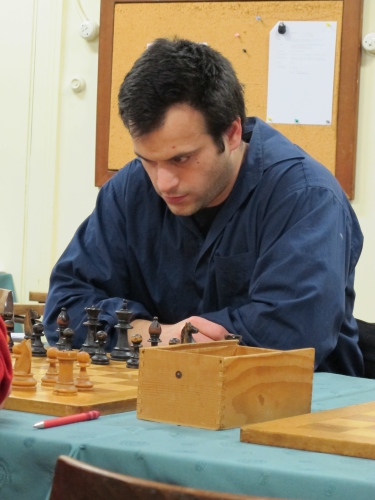


This week's pair of games are by Dutchman Niels Engelen, who writes:
I was born in The Hague in Holland, on June 6th 1981. When I was 12, I sometimes played chess with my father on the computer, and when I was 19 I became a member of the chess club Discendo Discimus.

While studying, I became a bit obsessed with chess, collecting and printing a lot of games from Chessbase 8.0 (it was a long time ago...). I also subscribed to New in Chess and even met Dirk Jan ten Geuzendam (chief editor of the magazine) some years ago in the tram in The Hague.
Although I did all this work, my chess skills didn't seem to improve. I didn't get any tips from others on how to improve, until this changed some years ago, when I started doing a lot of exercises and began to study pawn and rook endgames.
My personal path to improvement has involved reading Silman's complete endgame course, 101 Chess Endgame Tips, Chess Endgame Training and Dvoretsky's Endgame Manual.
I also think it's important to do lots of exercises. I have worked through examples from these books: The Complete Chess Workout, Practical Chess Exercises and all of Jacob Aagaard's books (on calculation, strategic play and positional play).
At my own chess club I see a lot of chess players who have been playing for years with no improvement. However, I believe that with good study material you can improve your chess skills no matter how old you are. But of course you have to put some energy in it.
Playing through games from magazines and studying isn't enough. [...] You also need to play and at the age of 37 I'm enjoying chess more than when I was a student — I play regularly in the Netherlands, winning more often against 1900 and 2000 players than previously. I have also written some chess endgame manuals for my chess club. It is in Dutch.
I'd like to mention two very good friends from the chess club — Rein de Ruiter and Jaco Arkesteijn, whom I play against regularly at the club and in cafes.
By profession, I am a software developer, mostly web based. But sometimes I also build some desktop applications. I am working with .NET, Angular, MSSQL and PHP.
Also, sometimes I ride race bikes. Two years ago I cycled every week with the racing bike team "lola Cycling" from The Hague.
The two games Niels sent me are first lukewarm and then ecstatic. His endgame skills were very much to the fore in the first. He provided lots of notes which I've left fairly untouched, while adding my own comments as JS.
Click or tap the second game in the list below the board to switch games
Did you enjoy the column and instructive analysis by GM Jonathan Speelman? Do you wish you could have a world-renowned grandmaster analysing your play? You can!
To submit your games just upload a PGN or ChessBase file (.pgn or .cbv archive), along with your name and e-mail address. Send one success story (Ecstasy) and one loss (Agony).
Tell why you chose them, where or when they were played. Please do include your email address, so Jon can reply, and preferably a photo of yourself for our article.
If your game is selected Jon will contact you personally, and not only will you get free detailed commentary of your games by one of chess’s great authors and instructors, and former world no. 4 player, but you also win a free three-month ChessBase Premium Account!
A three-month Premium subscription to ChessBase Account means you get: